Football
Gianluca Vialli was a star player for Chelsea who won some of Europe’s biggest prizes on the field and became a role model off it.
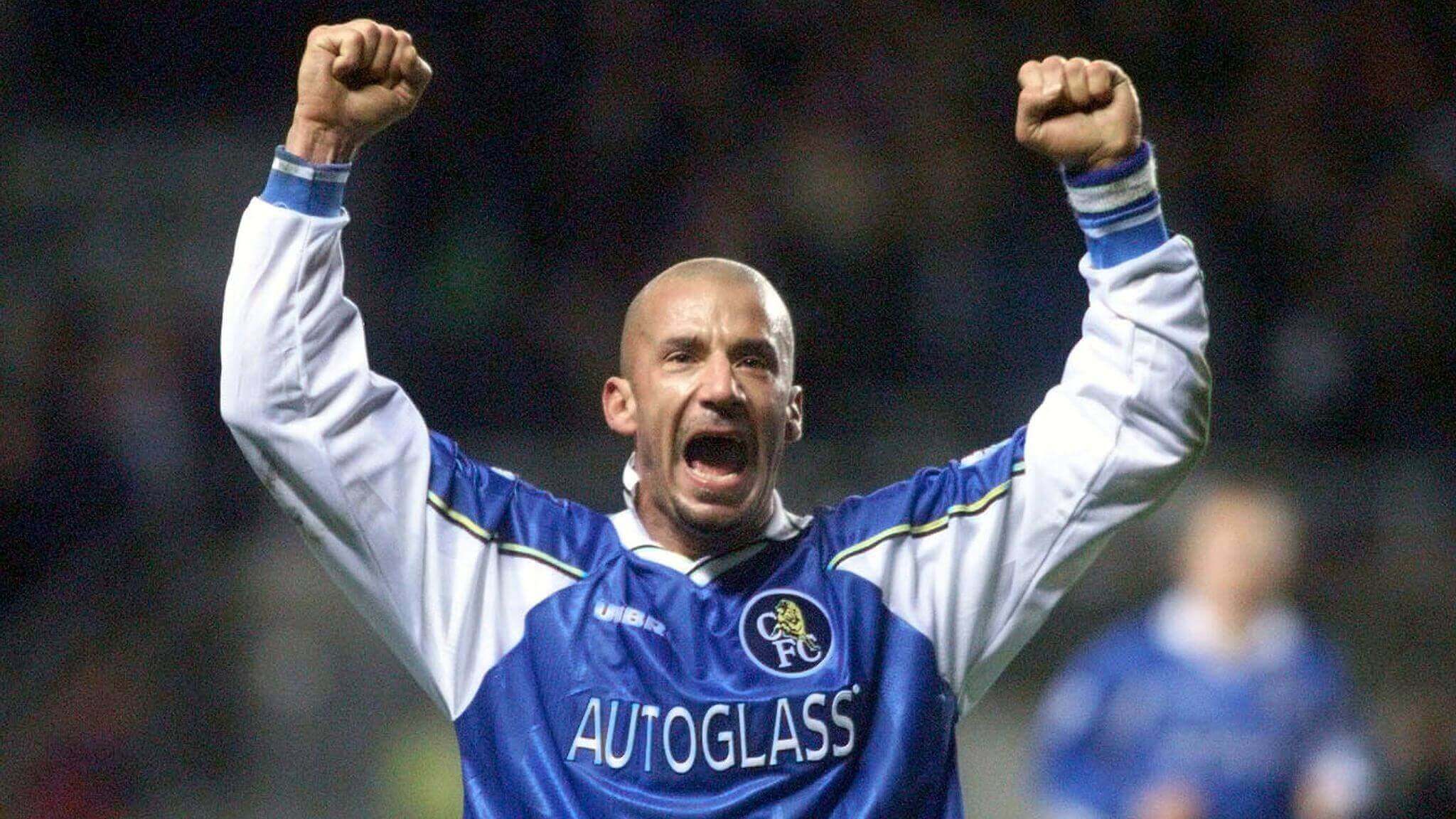
Gianluca Vialli died of cancer at the age of 58. As a player and manager for Chelsea, he helped change the game in England and was a very well-known figure. He cheered on his old friend Roberto Mancini as Italy won Euro 2020.
Gianluca Vialli stood alone in Wembley Stadium an hour before Italy’s final with England. Calm before the storm. Reflection.
This had been a long voyage.
This venue was a favorite of Vialli’s. Vialli lost the 1992 European Cup final in extra time with Sampdoria before winning the FA Cup, twice, the League Cup, and the Charity Shield with Chelsea.
He returned to football after 20 years.
Vialli was at Wembley, just a few miles from his London home, to see an old friend and his countrymen make history.
Roberto Mancini, Vialli’s hero since he was 14 and his Sampdoria strike partner in the 1988 European Cup final loss to Barcelona, invited him to take a leadership role with Italy. To function as a mentor to players and staff, and to encourage this generation.
Accepted. It was a chance to support his “Goal Twin,” as he and Mancini were known at Sampdoria, and to start a new chapter in his life.
Vialli battled pancreatic cancer in 2018. A year before the 2021 Wembley final, he was given the all-clear; his comeback to football and work with Italy distracted him from the cancer.
Those calm minutes by the center place were thought-provoking.
Four hours later, he was out celebrating again.
After a hard-fought match, Italy won on penalties. Vialli couldn’t bear to watch. Nervous, he stood alone, facing away from the goal.
When he won, he hugged Mancini with relief, excitement, and elation.
His Wembley moment. Another outstanding accomplishment.
It was his final football victory.
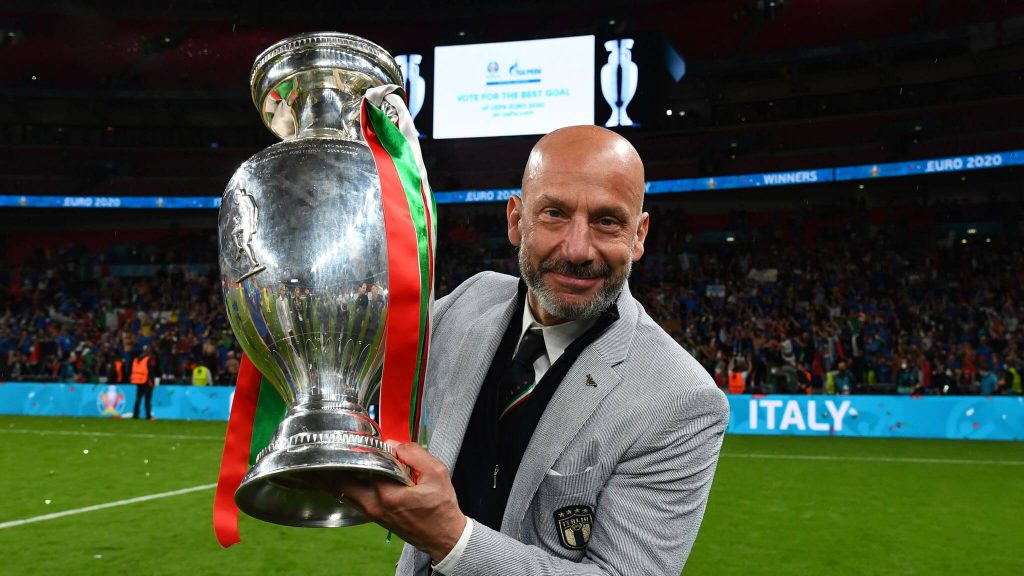
Five months after winning at Wembley, Vialli told everyone that his cancer had come back. He had to leave the national team in December to focus on his fight, which sadly ended on January 6, 2023, when he was 58 years old.
The fact that Vialli died in west London 22 years after he was fired as Chelsea manager shows how much he cared about the club, its fans, and the area. For Chelsea fans, it’s the same way around. At Stamford Bridge, everyone loves him and sings his name to the tune of “Amore.”
He or she won the Champions League. A Serie A winner. A striker who has won four Italian Cups and several European trophies. The player who costs the most in the world… By the time he joined Chelsea in the summer of 1996, Vialli had done it all.
He was a teen star at Cremonese and helped them move up the leagues. Then, he and Mancini scored the goals that helped Sampdoria win five major trophies, which was the best time in the club’s history.
In 1992, he moved to Juventus for a record-breaking £12.5 million and won more trophies, including the long-awaited Champions League title that made up for Ronald Koeman’s goal at Wembley.
He had been to three major tournaments with the Azzurri and was on the team of the tournament at Euro 88.
Still, Vialli’s time with Chelsea will be the thing that English football fans remember most about him after he died.
This is partly because of a culture that is focused on itself, but it is also a sign of how important Vialli was in changing the way English football worked in the mid- to late-1990s.
During that time, there was a growing number of foreign players. During the 1996–97 season, 122 players from outside the UK and Republic of Ireland played in the league. This was more than a third more than the year before.
When Vialli joined the division, there were seven Italians, but there had only been one the season before.
Vialli caught people’s attention with his exciting style of play, his charismatic personality, and his unique look, with his shaved head and Chelsea sweatband.
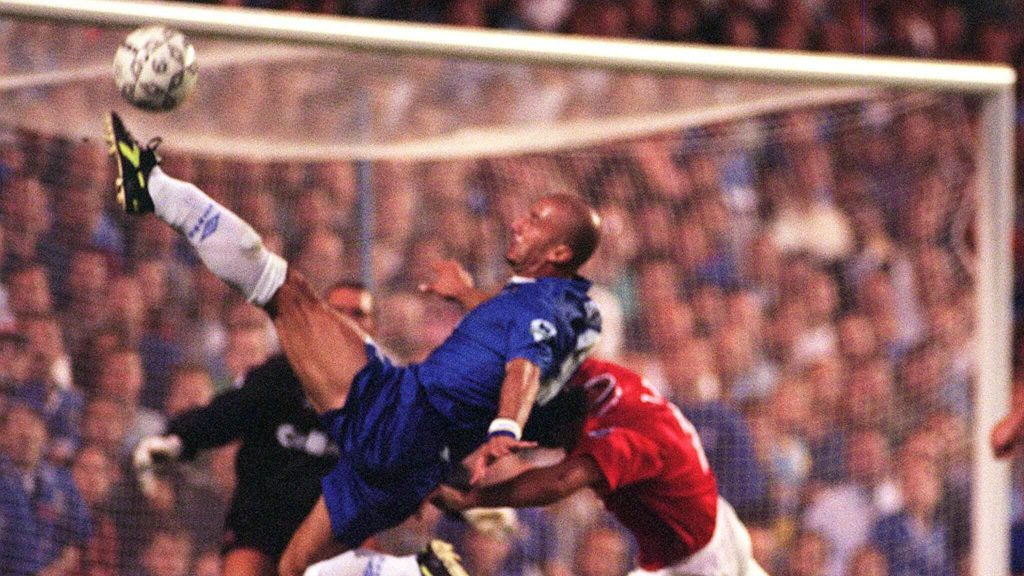
His fights with Ruud Gullit, the player-manager of Chelsea, also made the news. The Dutchman made fun of Vialli’s smoking habit, and the two had a fight that led to Vialli only getting a few minutes of playing time at the end of the 1997 FA Cup final win over Middlesbrough. This was despite the fact that Vialli had scored twice to break a tie with Liverpool earlier in the tournament.
Vialli had been in a fight with a coach before. After rumors of a practical joke, Arrigo Sacchi never picked him again for an international team after 1992.
But his big personality was part of what made him so interesting, and Vialli would get the last laugh at Chelsea when he took over from Gullit as player-manager in February 1998. He used the progress Gullit had made in the cup competitions to win the League Cup and the UEFA Cup Winners Cup in just a few months.
It’s easy to see why Chelsea fans fell for him. He was a great striker, a manager who won trophies, and a stylish Italian. With Gianfranco Zola and Roberto Di Matteo on his team, “il Tricolore” was making history with his teammates.
Vialli was a great player when he was young. He played well for Italy’s U21 team and was the top scorer in Serie A when he was only 20 years old. He also showed how quickly he could learn how to coach.
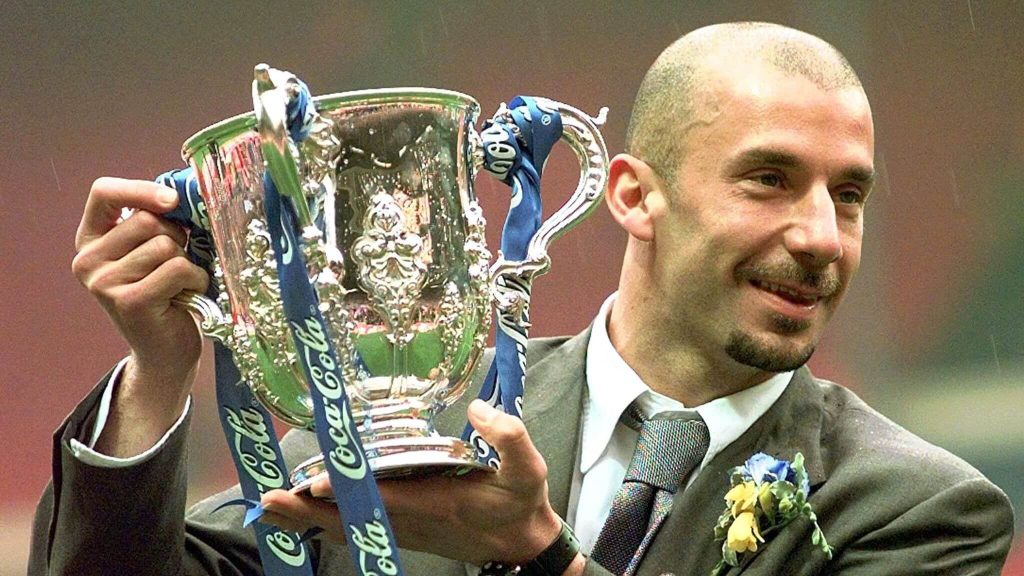
When he won his first two trophies, he was only 33 years old. This made him the youngest manager in UEFA history to win a title. In 1998 and 1999, his reputation kept getting better.
The season started off well when Chelsea beat Real Madrid in the Super Cup. At the end of the season, Chelsea finished third in the league, which was their best finish since 1970.
As the first Italian manager in the Premier League, it was a feather in Vialli’s cap, but he wanted more. Before the season, he talked up the team’s chances of winning the title, and he led them to the top spot at Christmas. In the end, they were four points behind the winner, Manchester United.
His high hopes for Stamford Bridge cost him in the end, but Chelsea’s first-ever qualification for the Champions League was a reward for his good work during his first full season in charge.
Vialli retired in May 1999, at the age of 35, because he wanted to focus on coaching. He scored 10 goals in 20 games, including one against Derby at Stamford Bridge on the last day of the season, which shows how good he was for a long time. That was his 40th goal for Chelsea in 83 games, which is a great rate, especially since 35% of those goals came when he was also in charge of the team.
With the turn of the century, his reputation in west London grew even more after he beat Barcelona in the first leg of the Champions League quarterfinals and then beat Aston Villa in the FA Cup final.
The next August, Vialli and Chelsea also won the Charity Shield. It was the last club game to be played at the old Wembley, which has been a big part of Vialli’s career. It was also the fifth and final trophy of his short but successful time as a manager. Since he didn’t win a second title in 1999/2000, he was fired harshly after a slow start to the next season.
Vialli couldn’t do it again while he was in charge of Watford for a season, so he moved into the business and media worlds until Mancini called him in 2019.
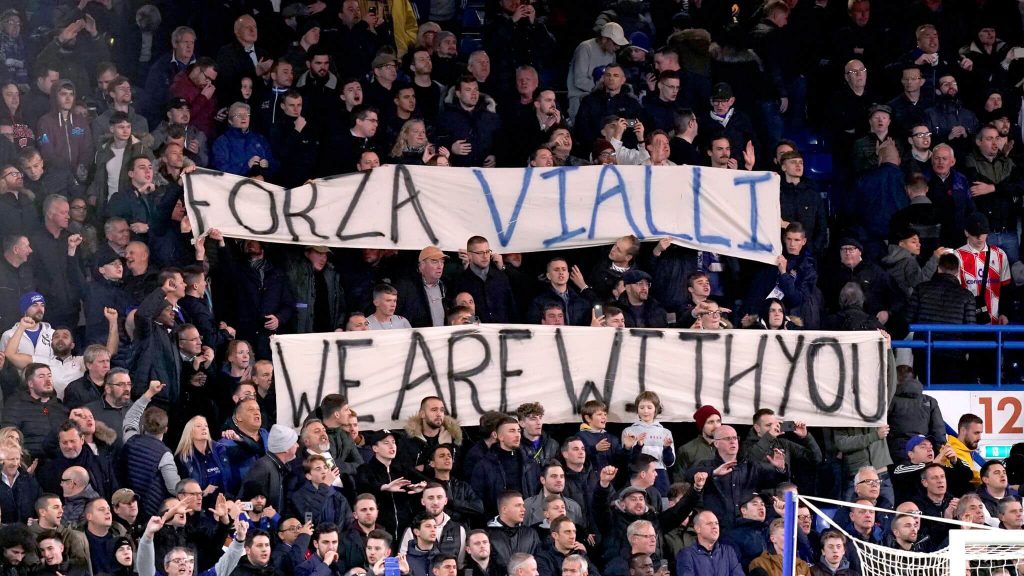
By that time, being sick had given him a clear view of life. In an interview with the Italian TV station RAI 1, he said that cancer was his “unwanted travel companion.” “It got on the train with me, and I have to keep my head down and never give up, hoping that one day this unwanted guest will get tired and leave peacefully for many years because there are still so many things I want to do in this life.”
Maybe when he stood in the middle of that Wembley pitch, after all the ups and downs he’d been through in that part of London, he appreciated the chance he’d been given, with a break from his illness, to help his best friend Mancini lead Italy to its first European title since 1968.
But Vialli had hoped that how he dealt with cancer would have an even bigger effect.
“I know that people can look at me, see that I’m doing well, and hope that they can do the same,” he said. “I was a football player and a strong man, but I was also weak and vulnerable, so I think someone may have seen themselves in this.”
“I’m here with all my flaws and worries, but I also want to do something important.”
Vialli was a legend as a player and as a player-manager. He was a top performer who helped change the way English football was played. But his big personality and his brave fight against cancer made him an example for people on and off the field.
Football
Luis Rubiales FIFA Ban: Three-Year Prohibition by FIFA
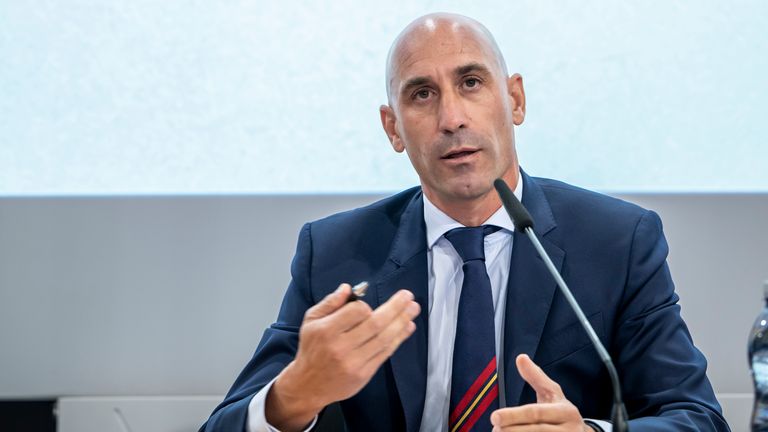
The global governing body of football, FIFA, delivered a strong message on Monday as it issued the Luis Rubiales FIFA ban, prohibiting former Spanish football federation chief Luis Rubiales from all activities related to the sport for a period of three years. This consequential decision comes in the wake of a controversy that emerged during the Women’s World Cup earlier this year. Reports revealed that Rubiales was found guilty of gross misconduct, specifically for an incident that overshadowed Spain’s victory at the World Cup trophy ceremony in Sydney.
The Controversial Incident
A disciplinary committee was promptly assembled to investigate the disturbing incident, yet the specifics of the verdict have not been disclosed to the public. Rubiales faced severe charges related to what FIFA described as a violation of the “basic rules of decent conduct” and “behaving in a way that brings the sport of football and/or FIFA into disrepute.” The episode in question pertains to an incident where Rubiales forcibly kissed a Spanish player on the lips during the trophy ceremony, tainting what should have been a moment of triumph for the nation’s football team.
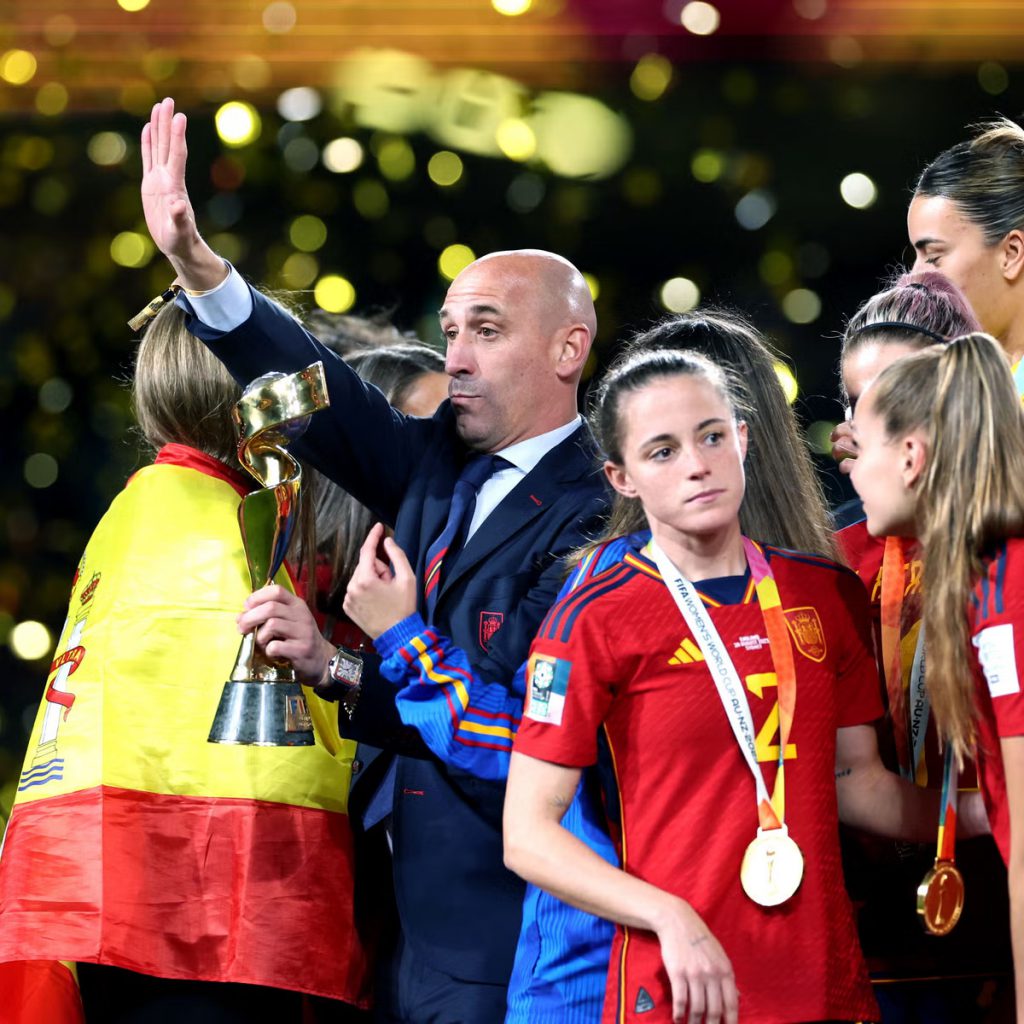
Misconduct and Resignation
The aftermath of the incident was marked by Rubiales’s initial defiance and refusal to acknowledge any wrongdoing, leading to a prolonged period of controversy. However, mounting pressure from various quarters, including the Spanish government and the national team players, eventually forced Rubiales to resign from his esteemed position within the Spanish football hierarchy. The incident not only tarnished Rubiales’s reputation but also cast a shadow over the accomplishments of the national team.
Ban and Appeal
While the FIFA ban on Luis Rubiales has been imposed for a duration of three years, Rubiales still has the option to contest the verdict. FIFA has granted him a window of ten days to request a review of the decision, following which he can file an appeal with the governing body. It remains to be seen how Rubiales will proceed in light of this substantial ban.
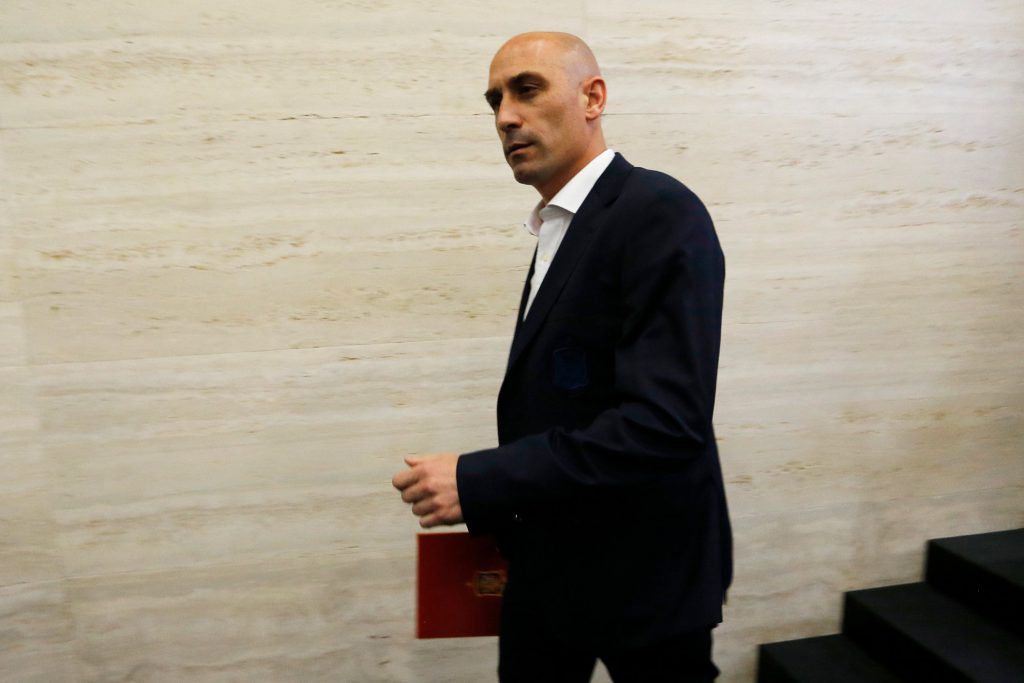
The Response and Controversy
Despite facing widespread backlash, Rubiales has garnered some support, notably from his mother, Angeles Bejar. In a bold demonstration of solidarity, she initiated a hunger strike to protest what she described as “the inhumane and bloody hunt” against her son. While some may sympathize with Rubiales, the gravity of the incident and the subsequent ban imposed by FIFA underscore the importance of maintaining integrity and respect within the world of professional sports.
In conclusion, FIFA’s decisive action against Luis Rubiales serves as a reminder that no individual, regardless of their position, is above the fundamental values of respect and sportsmanship that form the bedrock of football’s global community. As the sport continues to evolve, the need for upholding ethical standards remains paramount, ensuring that the spirit of fair play and camaraderie endures for generations to come.
Football
Rubiales Scandal: Soccer’s Integrity Unveiled
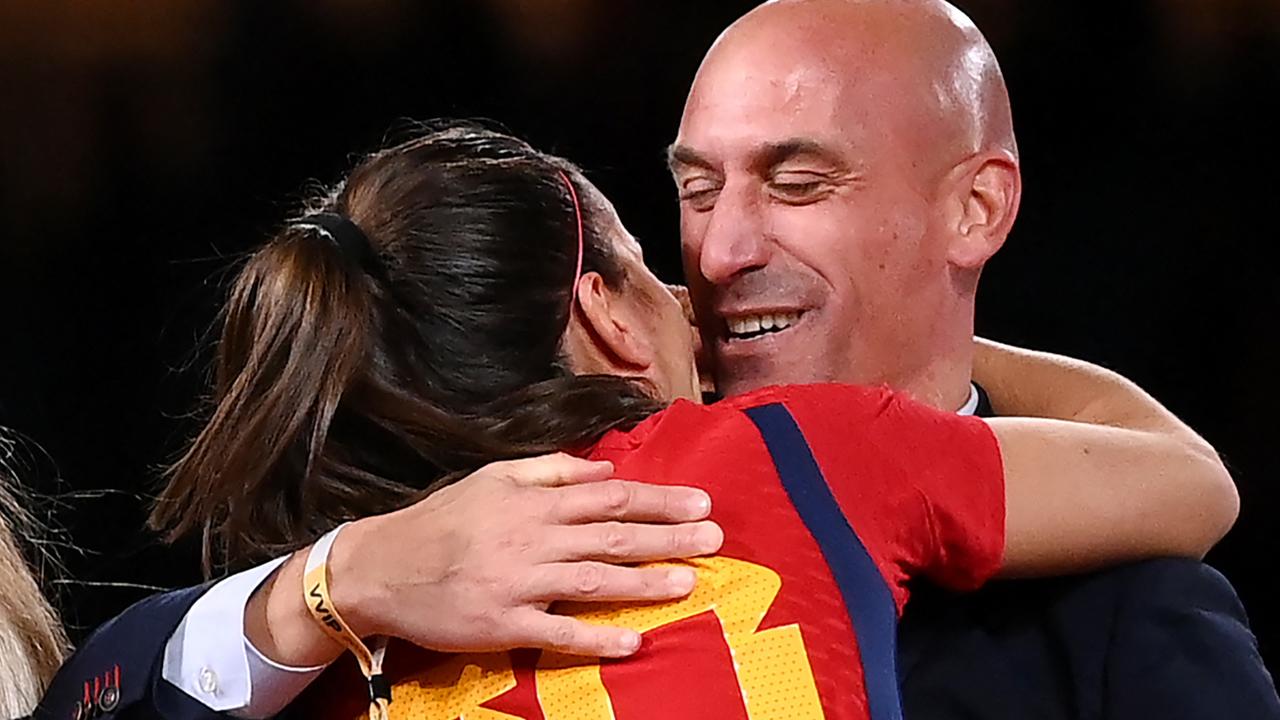
Exploring the Rubiales Scandal and Its Implications
In the world of soccer, where triumphs and controversies intertwine, the recent incident involving the president of the Spanish soccer federation, Luis Rubiales, has ignited a fiery debate. Reports from Spanish media suggest that Rubiales might resign from his position after five years of leading the body. The controversy stems from an episode where he kissed a player during a celebration and his subsequent actions during a significant match. This article delves into the details of the incident, the potential repercussions, and the broader implications for both Rubiales and the soccer community.
The Kiss that Stirred Controversy
The Spanish soccer federation president found himself in hot water due to an unexpected gesture. Following Spain’s victory in the Women’s World Cup final, Rubiales kissed player Jenni Hermoso on the lips during the trophy and medal ceremony. This gesture, intended to be celebratory, quickly became the center of attention and sparked a wave of discussions.
The incident prompted FIFA, the global governing body of soccer, to intervene. FIFA’s disciplinary committee initiated an inquiry to determine whether Rubiales’ actions violated the organization’s code of conduct and brought the sport and FIFA into disrepute. The core issue here is whether Rubiales’ behavior aligns with the principles of decency expected from a soccer official.
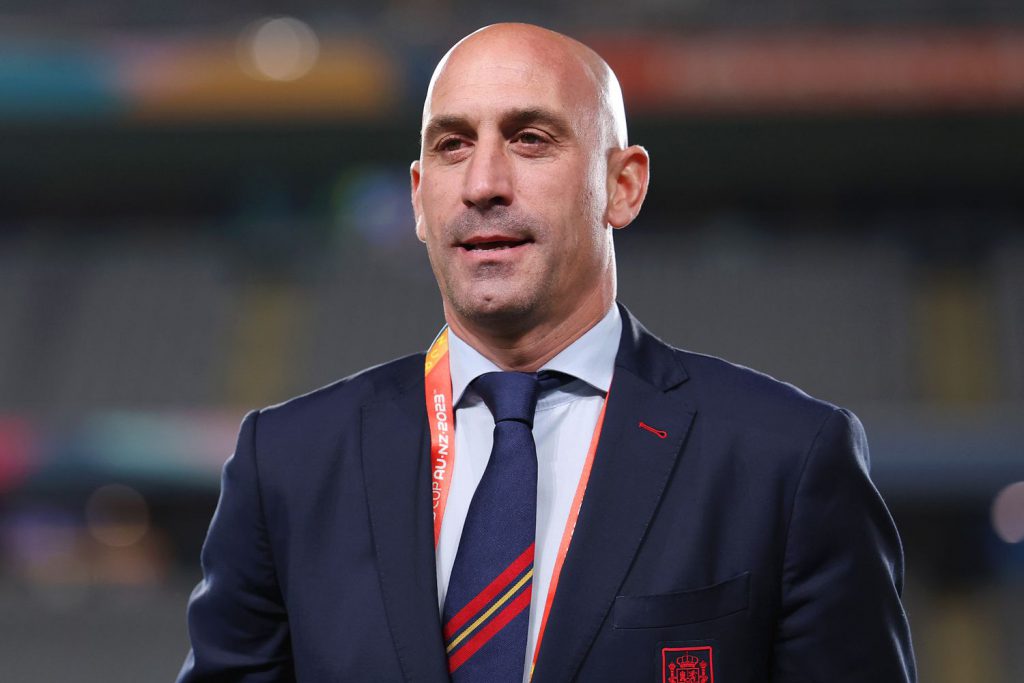
Amidst the uproar, reports surfaced indicating that Rubiales might step down from his role as the president of the Spanish soccer federation. The speculation has fueled further debates about whether resignation is an appropriate response to the controversy. If Rubiales indeed resigns, it would mark the end of his five-year tenure at the helm of the organization.The incident has drawn mixed reactions from both the public and the players. While some view the kiss as a harmless expression of celebration, others see it as an inappropriate breach of professional boundaries. Player Jenni Hermoso expressed discomfort with the kiss, and the national players’ union, once led by Rubiales, called for accountability regarding his actions.
FIFA issued a statement reaffirming its commitment to upholding the integrity of all individuals associated with the sport. The organization condemned any behavior that contradicts this commitment. While FIFA did not specify the exact acts under investigation, their emphasis on maintaining the sport’s reputation is clear.
Beyond the kiss, Rubiales’ conduct during the match drew attention. He was seen making a gesture by grabbing his crotch as a victory celebration. This action further added to the controversy, raising questions about appropriate behavior for a soccer official, especially in the presence of dignitaries.
The FIFA disciplinary panel has the authority to impose various sanctions on individuals found in violation of its code of conduct. These sanctions can range from warnings and fines to suspensions from soccer-related activities. The severity of the punishment will depend on the outcome of the investigation and the panel’s assessment of the situation.
Luis Rubiales holds the position of vice president at UEFA, the governing body for soccer in Europe. This role carries both prestige and responsibilities. The controversy has yet to garner a response from UEFA president Aleksander Čeferin, leaving the soccer community curious about the organization’s stance on the issue.
Rubiales is currently spearheading a bid to host the men’s World Cup in 2030, a joint effort involving Spain, Portugal, Morocco, and possibly Ukraine. However, his involvement in the Rubiales Scandal has raised concerns about the bid’s viability and the image projected to potential supporters.
The incident has wider implications for both the Spanish soccer federation and the broader soccer landscape. It highlights the importance of maintaining professionalism and ethical conduct within the sport’s leadership. The outcome of this controversy could set a precedent for addressing similar situations in the future.
As the Spanish soccer federation holds an emergency meeting to address the situation, the soccer community awaits a decision. The meeting’s outcome will not only impact Rubiales’ future but also shape the federation’s trajectory. The controversies surrounding this incident underscore the need for open discussions about behavior expectations and consequences.
The Rubiales Scandal serves as a reminder that even in the world of sports, actions can have far-reaching consequences. The incident involving the kiss and subsequent gestures has ignited discussions about leadership, professionalism, and the image projected by soccer officials. As FIFA investigates the matter, the soccer community anticipates the outcome and the potential shifts it may bring.
Football
Vlahovic Double Helps Juventus beat Salernitana 3-0.
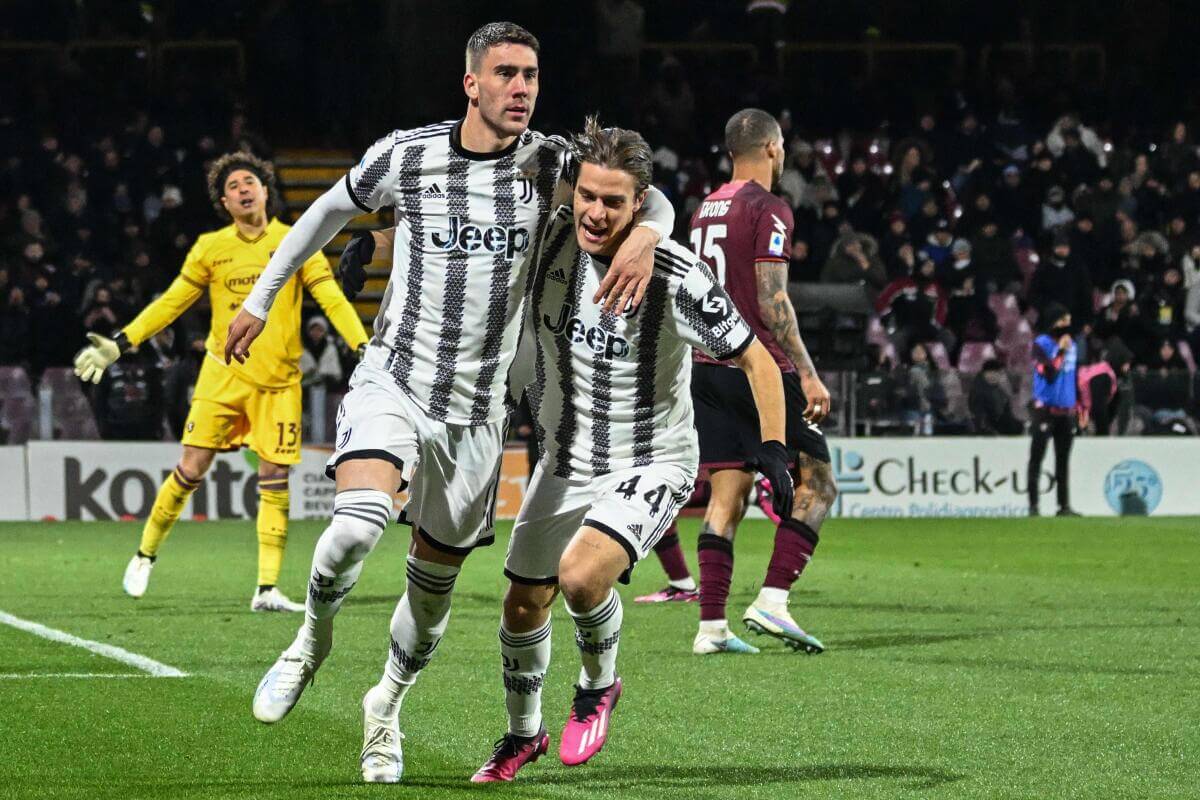
Juventus beat Salernitana 3-0 in Serie A on Tuesday, with striker Dusan Vlahovic scoring two goals and setting up another to lift the visitors to 10th in the table.
Vlahovic, a Serb who has been injured a lot this season but played in the league for the first time since October, found his old form again in this match.
Hans Nicolussi gave Juventus a penalty kick when he sent Manuel Locatelli off in the 26th minute. Vlahovic converted the penalty.
Vlahovic almost scored a second goal in the 37th minute, but his shot from the edge of the box from an acute angle went just past the post.
At the end of the first half, Filip Kostic made it 2-0 when he tapped the ball in from close range after Vlahovic’s initial shot had bounced into his path.
In the last seconds before the halftime break, Locatelli ran into the penalty area unchallenged and gave Juventus a chance to score a third goal. However, Salernitana goalkeeper Guillermo Ochoa reacted quickly to prevent Locatelli from lobbing the ball over him.
80 seconds into the second half, Vlahovic scored his second goal when he ran through the penalty area and shot the ball flat into the right corner.
In the 51st minute, Junior Zambia hit a cross that reached almost everyone in the box, but Salernitana striker Boulaye Dia could not stretch far enough to put the ball in the open net.
“The team responded well and we played a good first half. But after taking a 3-0 lead, we got a little too comfortable and allowed too many shots on goal. We did not move enough and stayed in the same places, and the players know we have to do better,” Allegri said.
“In the first 10 minutes we played the ball too often down the right side. We need to improve the passing game, become more supple and keep things simple.”
Angel Di Maria hit the crossbar after 53 minutes and Moise Kean hit the post just before the end of the game, preventing Juve from adding to their tally.
The win moved Juventus to 26 points after 21 games, while Salernitana dropped to 21 points and 16th place.







You must be logged in to post a comment Login